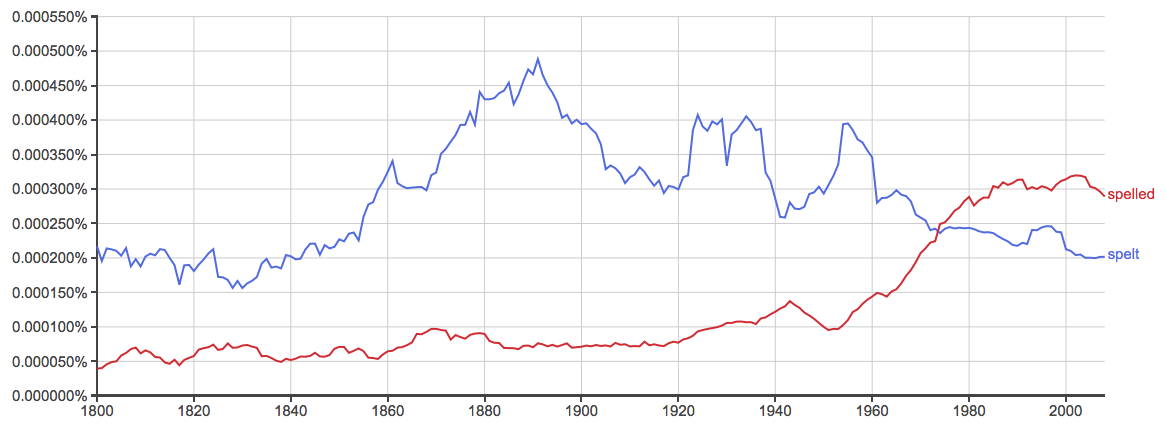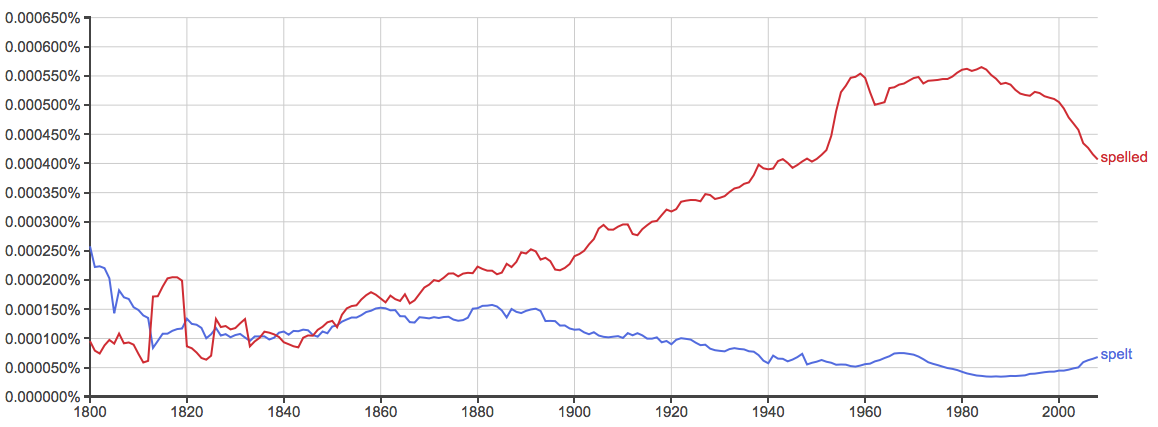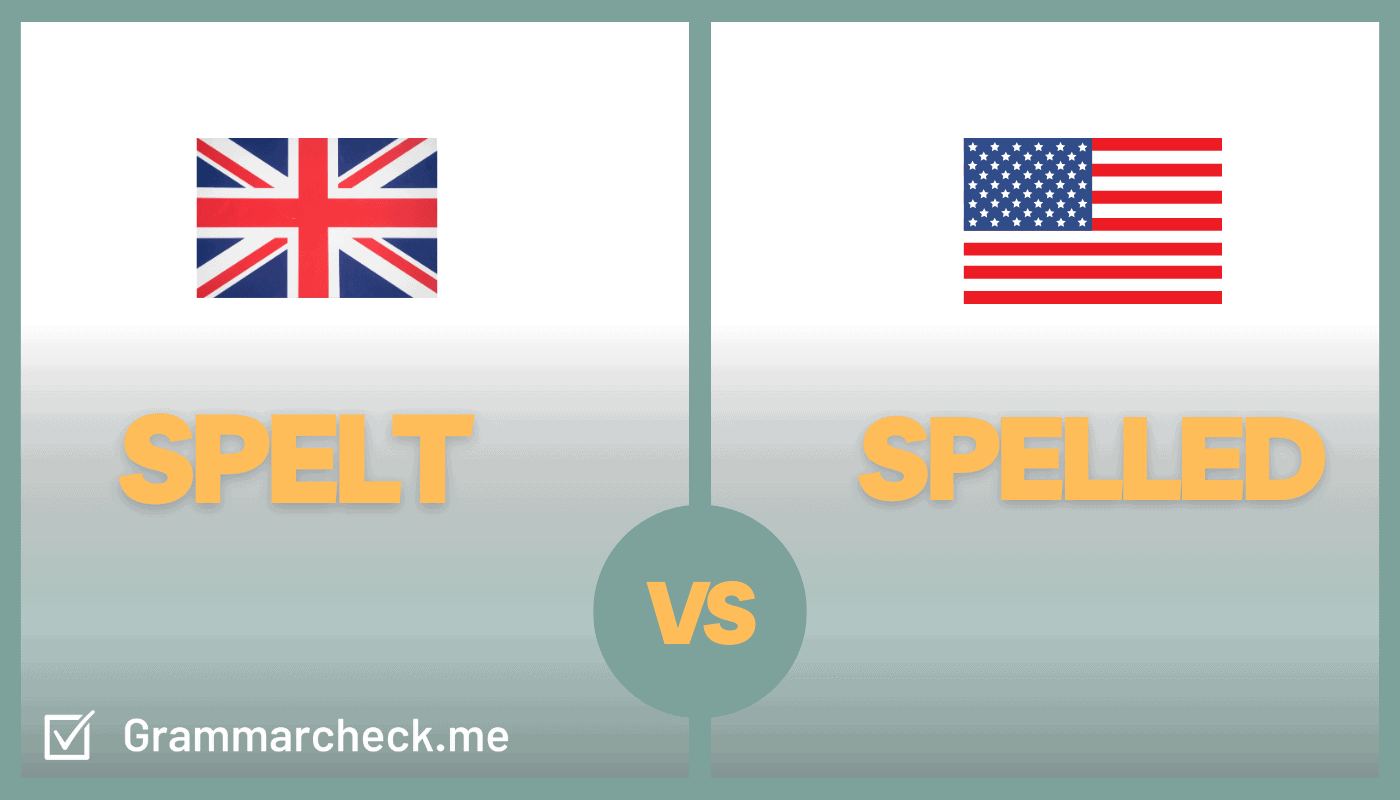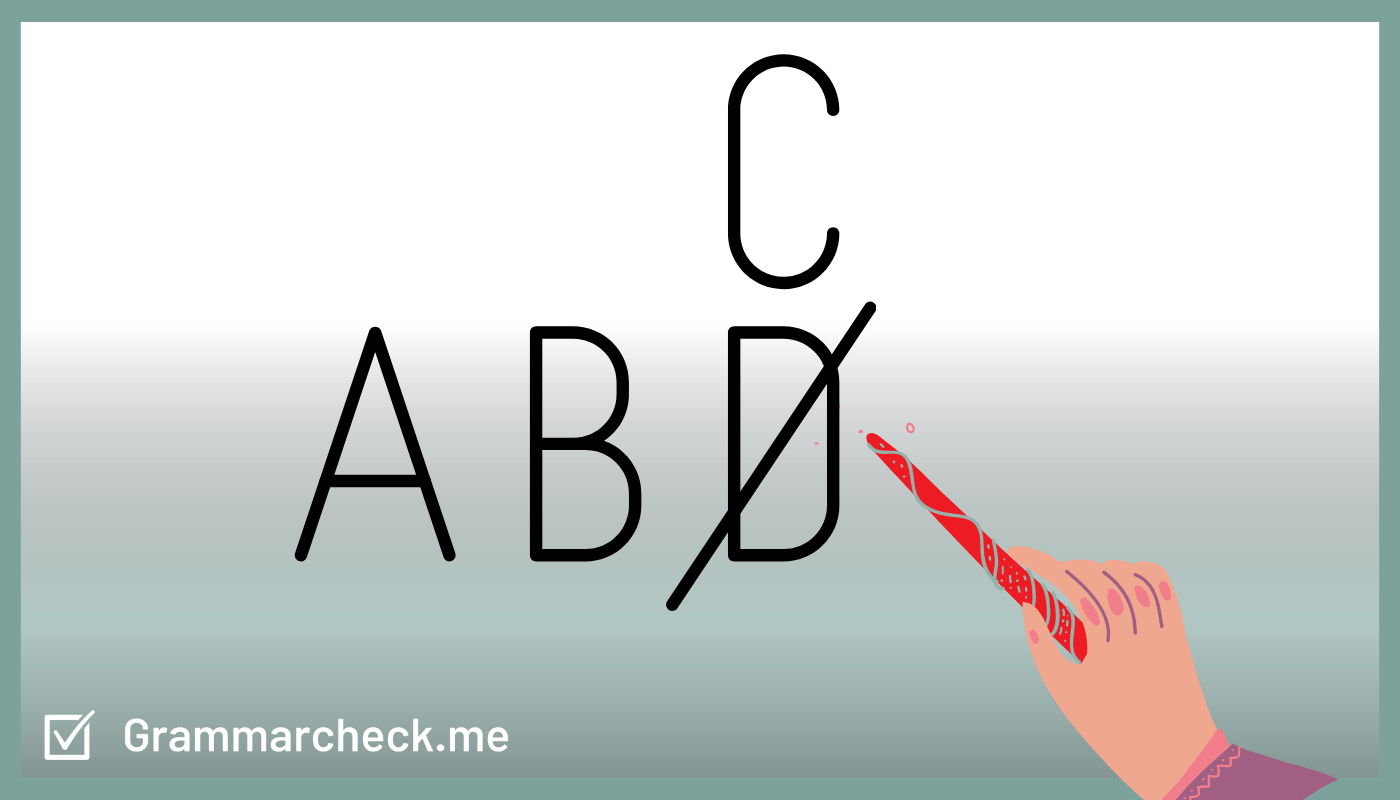The English language has a lot of irregular verbs. Irregular verbs are verbs that don’t take on the typical past tense spelling pattern.
Talk is an example of a regular verb. It changes from present to past by adding an “ed” to the end of the word.
- I talk.
- I talked.
Speak is an example of an irregular verb. It completely changes when it forms the past tense.
- I speak.
- I spoke.
Well, the verb to spell is actually an English verb that has both a regular and an irregular form.
- I spell. (Present)
- I spelt. (Past)
- I spelled. (Past)
Both of these forms are correct, but they’re not always interchangeable. Sound confusing? Don’t worry. I’ll explain everything you need to know about spelt vs. spelled below.
What is the Difference Between Spelt and Spelled?
In this post, I will outline the different uses of spelled vs. spelt and when it is correct to use each spelling.
Plus, at the end, I will give you a helpful trick for remembering their different uses.
When to Use Spelt

- The investigation revealed that Bradbourn’s name was spelt incorrectly on paperwork. –The Guardian
Over the 19th and 20th centuries, spelt was much more commonly seen in British writing than spelled. It wasn’t necessarily considered a mistake to use spelled in Britain, spelt just happened to be the preferred, more common spelling.
This preference seems to be waning, however, as spelled has grown in popularity in Britain in recent years (see below).
This chart is not scientific or exhaustive by any means (it only covers English books), but it is helpful in identifying trends, and the trend is clear. Whether or not spelled is actually used more frequently in British English than the once more popular spelt, we can’t be sure.
But it is clear that the frequency of spelled is on the rise in Great Britain.
Spelt as a noun. Spelt can also be used as a noun. It refers to a type of wheat that was widely cultivated in southwest Asia, the Near East, and Europe during the Bronze Age. In modern day, it is grown chiefly in Europe.
- The spelt buns need little time to rise because spelt grain reacts so swiftly with yeast, so they can be made–unusually for bread–alongside the soup. –The Telegraph
Spelt or Spelled in British English
All of this is to say that both forms (spelt and spelled) are accepted in British English. Most British, Irish, and Australian writers don’t seem to make a distinction between them.
This trend is almost certainly a result of American influence spreading (see below).
When to Use Spelled

- Icelanders’ pronunciation of place-names is confounding even when you have the words spelled out on paper. –The New Yorker
This preference in American English has been clear for quite some time.
As you can see, spelled has been the preferred spelling in American English for some time and the gap between the two is quite large.
In fact, spelt is generally considered a misspelling in American English.
If you are a student in America, or ever find yourself writing to an American audience, spelled is the correct choice.
Spelt out or Spelled out?
The most common use of to spell is, of course, to name or write in order the letters constituting a word.
- My name is spelled J-O-H-N.
And, as we learned, spelt is more common in British English, spelled is more common in American English.
What about other meanings or phrases using the word?
The phrase to spell out, to make clear or explicit, usually employs spelled.
- He spelled out the details of his plan.
You can find publications that use spelt out, but they are less frequent.
Similarly, phrases like spelled trouble, spelled disaster, spelled ruin, etc., all use spelled more frequently than spelt—in British and American English.
Trick to Remember the Difference
Still not sure when to use spelled or spelt? Here’s a helpful trick to help you remember.
Spelt is commonly used in British English. Spelt and British both have a letter “T” in them.
Summary
Should I use spelt or spelled? This depends on who your audience is.
Spelt has been the preferred choice in British English for many years, where spelled is also acceptable.
Spelled is the preferred choice in American English, where spelt is viewed as a misspelling.
Contents
- 1 What is the Difference Between Spelt and Spelled?
- 2 When to Use Spelt
- 3 Spelt or Spelled in British English
- 4 When to Use Spelled
- 5 Spelt out or Spelled out?
- 6 Trick to Remember the Difference
- 7 Summary
The verb, “to spell,” can mean “to signify” or “to explain in direct terms.” It deals with naming, writing, or suggesting a particular word order. But, all verbs have past tenses, meaning actions that occurred at an earlier period of time. This is one word that creates a bit of confusion in its accepted past tense.
“Spelled” and “Spelt” are both correct. They are the past simple of the verb “to spell”. “Spelled” is more common in American English and “spelt” is more common in British English.
Differences between Spelled and Spelt
For American English, “spelled” is the correct word order. So, you would say:
She spelled the wrong word.
But, for British English, “spelt” would be correct. However, it’s also acceptable to use “spelled,” albeit less frequently. Therefore, in this context you would say:
She spelt the wrong word.
Take note that it does seem as though most British, Scottish and Irish wordsmiths do not make a distinction between either. They will use “spelled” or “spelt” without rhyme or reason.
Definition-Based Examples
The above examples feature “to spell” in relationship to suggesting a particular order of words. When using it under the banner of “to signify,” you would say:
American or British: The intelligence leak spelled danger for the government.
British Only: The intelligence leak spelt danger for the government.
Likewise, when referring to the definition of “to spell” as a means of explicit explanation:
American or British: She spelled out the exact conditions that he must fulfill before they marry.
British Only: She spelt out the exact conditions that he must fulfill before they marry.
Spelt Confusion
Do not confuse the past tense verb “spelt,” with the noun, “spelt.” This latter word indicates a particular type of hulled wheat. If you use “spelt” in America, many people will understand it as a misspelling or think you’re talking about grain.
Mnemonic Device
If you have difficulty deciphering between the two words, there’s an easy trick to remember which is which. Both versions will have the root “spel.” The “T” in British equals “spelt” and the other is American “-LED,” or “spelled.”
Conclusion
So, essentially, where you are will dictate which version of the past tense word, “to spell” you will use. If you’re in the United States or any of its territories, use “spelled.” But, if you’re in the UK or any of its satellites, including Canada, use “spelt.”
- Author
- Recent Posts
Conor is the main writer here at One Minute English and was an English teacher for 10 years. He is interested in helping people with their English skills and learning about using A.I tools at work.
In the following sentence, should I say spelled or spelt:
You spelt/spelled «Pneumonoultramicroscopicsilicovolcanoconiosis» wrong.
tchrist♦
132k48 gold badges366 silver badges566 bronze badges
asked Nov 27, 2010 at 8:31
Mateen UlhaqMateen Ulhaq
1,5224 gold badges17 silver badges30 bronze badges
5
From Cambridge Advanced Learner’s Dictionary:
spell (FORM WORDS) /spel/
verb [I or T] spelled or UK AND AUSTRALIAN ENGLISH ALSO spelt, spelled or UK AND AUSTRALIAN ENGLISH ALSO spelt
This means that you should say «spelled» in US English and you can use both «spelt» and «spelled» in UK/Australian English.
answered Nov 27, 2010 at 9:20
7
Spelled vs spelt:
In American English, spelt primarily refers to the hardy wheat grown mostly in Europe, and the verb spell makes spelled in the past tense and as a past participle.
In all other main varieties of English, spelt and spelled both work as the past tense and past participle of spell, at least where spell means to form words letter by letter or (with out) to make clear. Outside the U.S., the two forms are interchangeable in these uses, and both are common.
But when spell carries the sense to temporarily relieve (someone) from work, spelled is the preferred form throughout the English-speaking world. This is a minor point, though, as this sense of spell is rarely used outside the U.S., where it is most common.
Spelled is not a recent Americanism as many people assume (including some who have commented on this post). Both spelled and spelt are old, and examples of each are easily found in historical Google Books searches covering the 17th and 18th centuries. It is true, however, that spelt was ascendant everywhere through most of the 19th century. This ended when Americans permanently settled on spelled around 1900.
(grammarist.com)
answered Apr 7, 2015 at 19:52
I believe the Guardian and Observer Style Guide has a better answer than just “it’s different between US / UK / AUS”:
spelled is the past tense
“she spelled it out for him”
spelt is the past participle
“the word is spelt like this”
answered May 30, 2015 at 9:51
RasmusRasmus
1843 bronze badges
1
This verb has both an irregular and regular form. You can use both and both are correct. Speakers in North America and Canada use spelled while the rest of the English-speaking world seems to prefer spelt but accept spelled as well.
But which is the most used one, spelt or spelled? Let´s look at Google Ngram Viewer tool which displays a graph showing how phrases have occurred in a corpus of books over the years.
Spelled is more used than Spilt from 1890.
Source: https://en.learniv.com/info/en/irregular-verbs/spelled-or-spelt-what-is-correct-and-how-to-use-it/
answered Feb 6, 2021 at 12:46
1
Mainly a correct British variant. In perhaps the best AmE dictionary:
spell
verb
spelled ˈspeld, ˈspelt (audio pronunciation) or chiefly British spelt ˈspelt (audio pronunciation) ; spelled or
chiefly British spelt; spell·ing; spells3 a : to name in order the letters of
Merriam Webster Unabridged Dictionary
answered Apr 7, 2015 at 19:51
Marius HancuMarius Hancu
7,6061 gold badge14 silver badges13 bronze badges
h2g2 Writing Guidelines say
Please use the word spelled rather
than spelt. There was a long-running
discussion about it and ‘spelled’ won
10 votes to 8. Besides, loads of
people thought that ‘spelt’ was a type
of wheat. Schpelled and spellted were
among the other suggestions. But no,
you can’t use them
answered Mar 3, 2011 at 14:53
TRiGTRiG
6,3834 gold badges48 silver badges64 bronze badges
7
What’s the difference between “spelt” vs “spelled”? Is one incorrect? Find out in this article.
English contains many words people need help figuring out the spelling and pronunciation for. One of the words that many people have trouble figuring out is the past tense of the word “spell.”
There’s some irony in confusion on whether it is “spelt” vs “spelled,” but it’s essential to know the difference between the two and when to use which in what context. Luckily, you’ve come to the right place to gain some clarification.
In this article, you’ll learn the difference between “spelt” vs “spelled” and how to use each variation of the word in your writing.
So what exactly is the difference between “spelt” vs “spelled”?
Takeaway: The short answer is that neither spelling of the word is entirely incorrect. However, the one that you would use primarily depends on your location.
The difference comes down to which side of the Atlantic you live. The UK is flexible in their spelling of the past tense of “spell,” so both “spelt” and “spelled” are acceptable spellings of the word. The same applies to other English-speaking areas of the world, such as Canada and Australia.
However, the United States is a little stricter with which spelling they prefer. Generally, you’ll see the word “spelled” more often than “spelt.” In fact, “spelt” is widely not accepted as a way to spell the word. It’s not that using “spelt” will be unrecognizable to anyone in the US, but it doesn’t align with the country’s traditional grammar and vocabulary rules.
So in most contexts, you can use any spelling of the word. However, in the US, you should only use “spelled.”
Spelt vs Spelled Meaning
Now that you know whether it’s “spelt” or “spelled,” it’s a good idea to also discuss the meaning of the word.
“Spelt” and “spelled” are both past tenses of the word “spell.” The word “spell” in this context means to write or say the order of letters of a word correctly. There’s another meaning to the word “spell,” where it refers to an incantation, such as in “casting a spell.”
However, if you use the word with that meaning, it will always be a noun, and the “spelt” vs “spelled” debate does not apply. And just as we learned in our post comparing the words inactivation & deactivation, even small spelling changes can change the meaning of a word!
The word “spell” is unique in that it’s both an irregular verb, meaning it doesn’t follow the traditional rules for conjugation, and a regular verb. This is illustrated through the spelling of the past tense of the word as “spelled” and “spelt.”
“Spelled” is the regular form of the past tense of “spell.” It follows the traditional rule that to turn a verb into its past tense form, you must simply add an -ed to the end. Meanwhile, “spelt” also exists and ignores that rule entirely – a common occurrence in English. Just like we saw in our post about what is a mansion, we saw how word choice & spelling can totally change the meaning of a word!
Spelled vs Spelt Examples
Now that you know the meaning of the word “spell” and how to conjugate it in the past tense, let’s illustrate with examples of “spelled” vs “spelt” in context and how both words can work the same in similar sentences.
- She spelled the word “Wednesday” wrong, but that’s a common mistake.
- She spelt the word “Wednesday” wrong, but that’s a common mistake.
In the example above, “spelt” and “spelled” both work in the sentence, and the rest of the sentence makes it difficult to distinguish whether it’s written in US or UK English.
However, in the following sentence, there are additional cues based on the spelling of other words:
- He spelt the word “fuschia” correctly because it’s his favourite colour.
- He spelled the word “fuschia” correctly because it’s his favorite color.
In the sentences above, “favorite” and “color” are each spelled differently. In UK English, these words are spelled with a “u.” However, in US English, there is no additional “u” in either word.
This indicates whether to use “spelt” or “spelled,” especially in the second US English sentence. Just like we saw in our analysis of the words programing or programming, even small spelling mistakes can make a big difference!
Misspelt vs Misspelled
The words “misspelt” and “misspelled” mean to spell something incorrectly and are the past tense form of the verb “misspell.”
Since the root word of “misspell” is “spell,” the same rules apply, including whether to use “misspelt” vs “misspelled,” with the former seldom being used in the US and both forms being acceptable in other areas around the world.
Here are examples of the word used in a sentence:
- My name was misspelt on my passport, so I had to get a new one.
- My name was misspelled on my passport, so I had to get a new one.
Frequently Asked Questions
Is it spelt incorrectly or incorrectly spelt?
Both can be used correctly in your writing. However, in the United States you should use spelled instead of spelt!
Which came first spelt or spelled?
In British English, spelt came first. Spelt was historically the correct spelling.
What does spelt correctly mean?
This means that a word has the correct spelling. You might say, “I lost 1 point on my vocabulary quiz because my answer was not spelt correctly.”
Final Thoughts
To recap, when it comes to whether to use “spelt” vs “spelled,” the rules are luckily not too complicated.
The main rule you should remember is to use “spelled” when writing in US English. Otherwise, you can use “spelled” or “spelt” in other circumstances.
However, it’s also important to note that depending on who you’re writing to or why, you may have to subscribe to specific rules or spell things a certain way. Always check whether you’re using US English or another variation of English to ensure that you’re adhering to the rules that you’re supposed to.
If you want to avoid “misspelling” words in your writing, consider using the Grammarly tool as the second set of eyes for your work.
⚡ Quick summary
The verb spell has two correct past tense forms. The past tense spelled is preferred in American English, while either spelled or spelt is acceptable in British English.
Spelling every word correctly isn’t always easy. Which word should we use when we want to talk about a spelling struggle we had in the past?
In this article, we’ll keep watch for any spelling shenanigans as we examine the words spelled and spelt, provide examples of how we use both words in sentences, and look at other verbs that are similar to the word spell.
spelt vs. spelled
Both spelt and spelled can be used as the past tense and past participle forms of the verb spell. They have the same meaning and are used interchangeably.
For example:
- She spelled/spelt her name as part of her cursive writing practice.
- The generals had spelled/spelt out the battle plan to the soldiers before sunrise.
- Over the years, spelling bee winners have spelled/spelt very tricky words on their path to victory.
In American English, spelled is the preferred form and is much more common. In British English, spelt and spelled are both considered acceptable and are used interchangeably.
Examples of spelt and spelled in a sentence
Let’s spell things out by looking at more examples of sentences that use spelt and spelled.
- All of the kids spelled/spelt Mississippi correctly.
- The reporter had spelled/spelt the president’s name wrong in the first version of the story.
- The thunder and lightning has spelled/spelt doom for our chances of holding the parade today.
Words similar to spell
Spell isn’t the only verb that has multiple possibilities for its past tense and past participle forms. Several other verbs also have past tense and past participle forms that can end in either -ed or -t. Some examples include:
- smell: smelled or smelt
- learn: learned or learnt
- burn: burned or burnt
- dream: dreamed or dreamt
- leap: leaped or leapt
- kneel: kneeled or knelt






